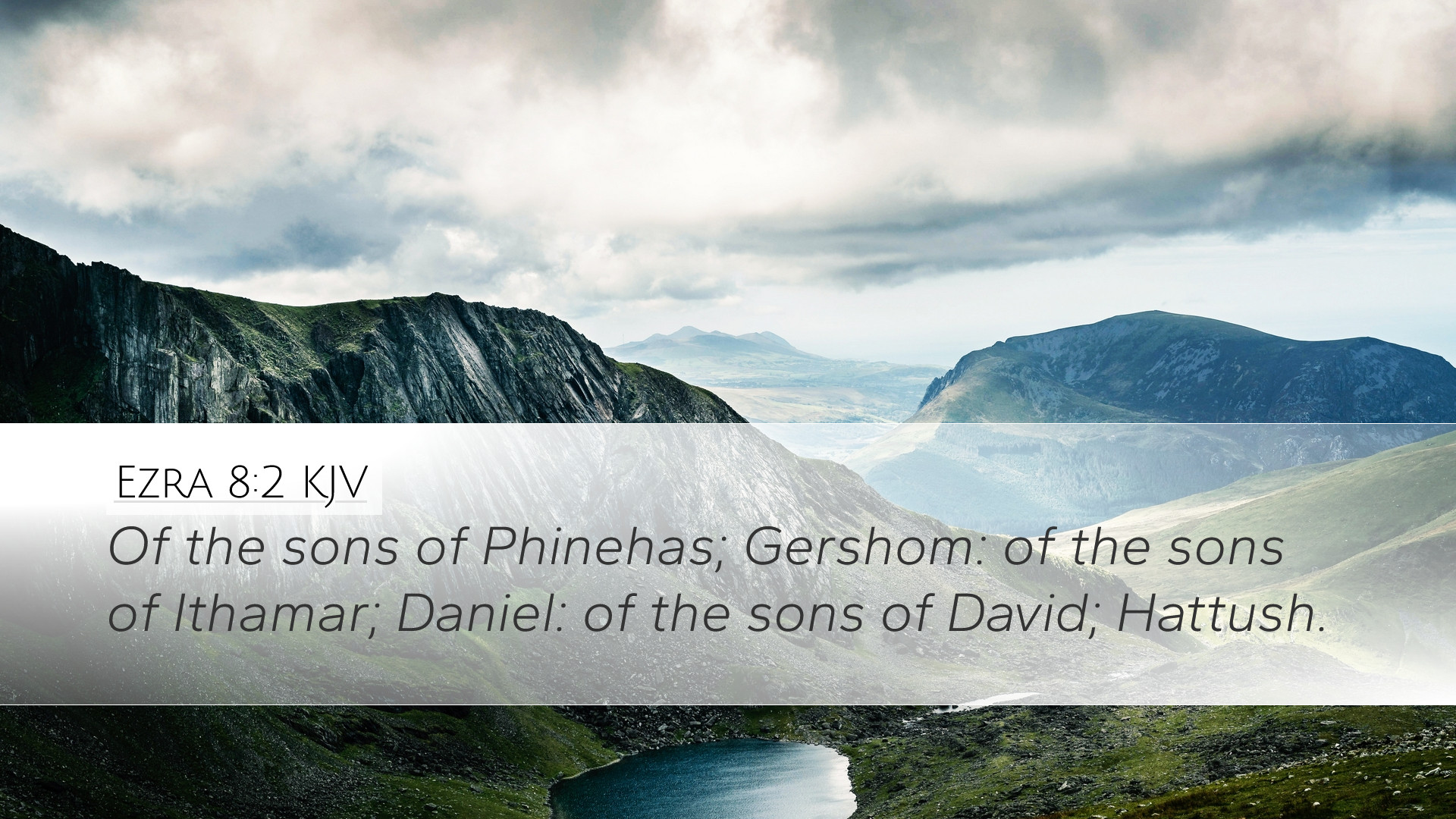Commentary on Ezra 8:2
Ezra 8:2 states, "Of the sons of Phinehas; Ezra the son of Phinehas." This verse is a part of the genealogy presented in Ezra, where Ezra, the scribe and leader of the Israelites, is introducing himself and his lineage. This verse is significant for understanding the legitimacy of Ezra's authority and role in the restoration of Israel after the Babylonian exile.
Historical Context
Ezra was a priest and scribe who led a group of exiles back to Jerusalem around 458 B.C. His mission was to restore the temple's worship and enforce the Law of Moses among the people of Israel. The genealogical records, like the one in Ezra 8:2, served to validate the heritage of the leaders and to confirm their rightful roles in the community.
Genealogical Importance
Matthew Henry emphasizes that the careful recording of genealogy in Scripture is not merely for historical purposes but serves a theological significance. It connects God's promises to individuals and allows readers to trace the fulfillment of God's covenant through specific lineages. Ezra's descent from Phinehas, a notable priestly figure, underscored the continuity of priesthood and God's enduring covenant with the Levites.
Lineage of Phinehas
- Phinehas' Zeal: Phinehas was known for his zeal in defending God's holiness (Numbers 25:6-13). His actions turned away God's wrath from Israel, and in return, God made a covenant of peace with him.
- Role in the Priesthood: As a descendant of Aaron, Phinehas' lineage was significant for the Levitical priesthood, and it established Ezra's authority to lead the religious reform upon his return to Jerusalem.
- Covenantal Significance: The mention of Phinehas in Ezra's genealogy signifies the faithfulness of God in maintaining His promises through generations.
Thematic Elements
Albert Barnes provides additional insight into the themes of leadership and the role of the scribe in Israel's post-exilic period. Ezra’s introduction of himself not only establishes his authority but also sets the stage for the spiritual renewal that he will bring.
Leadership Characteristics
As leaders of the people, Ezra and his contemporaries were tasked with teaching and enforcing the Law. Clarke elaborates on the idea that effective leadership is rooted in one’s relationship with God, thus emphasizing the importance of Ezra's priestly heritage:
- Spiritual Authority: Ezra's identity as a descendant of Phinehas provides him with spiritual authority, enabling him to guide the nation in returning to God.
- Role of the Scribe: Ezra the scribe was not just a copyist but a teacher who would instruct the people in the Law, reflecting a profound commitment to God's Word.
- Community Restoration: Ezra’s return was not only for personal restoration but also aimed at communal renewal, rekindling spiritual fervor among the people.
Theological Reflections
The genealogy of Ezra in Ezra 8:2 serves as a reminder of God's continuous guidance through history. Each name mentioned is infused with the weight of history, and as Clarke notes, these genealogies showcase God's providential care in preserving a remnant that would lead to the coming of Christ. The legacy of Phinehas points to the culmination of priestly duties that culminate in Jesus, the ultimate High Priest.
God’s Sovereignty
Matthew Henry asserts that God sovereignly chooses and prepares leaders to fulfill His purposes. Ezra, through his lineage, exemplifies how God orchestrates events and draws together a people for His glory:
- Faithful Remnant: Ezra’s lineage testifies to God's promise of a faithful remnant that would preserve true worship and the essence of the Law.
- Continuity of Purpose: The mention of Ezra’s ancestry connects the past experiences of Israel with their present mission, bridging the gap between exile and restoration.
Application for Modern Readers
For pastors, students, and theologians, Ezra 8:2 carries valuable implications for leadership in the church today. It underscores the importance of grounded authority in God’s Word and the necessity of a heritage rooted in faith for today's leaders:
Implications for Leadership
- Foundation of Leadership: Like Ezra, modern leaders must recognize their calling comes from God and is backed by a lineage of faith, encouraging them to embrace their heritage.
- Teaching and Discipleship: The modern church must prioritize teaching the Scriptures and instilling a passion for God’s law in the hearts of believers, mirroring Ezra’s mission.
- Faithfulness to God’s Call: Ezra’s example teaches that faithful adherence to God’s word is essential for effective ministry and spiritual renewal.
Conclusion
In summary, Ezra 8:2 is not merely a genealogical note; it is a profound statement of identity, authority, and the theological significance of lineage in God’s plan for His people. As we delve into the implications of this verse, we are reminded of God's faithfulness through history, the importance of spiritual lineage, and the call to respond with faithfulness in our own contexts.


